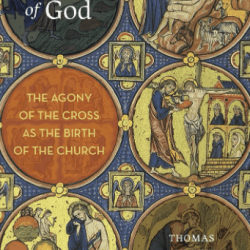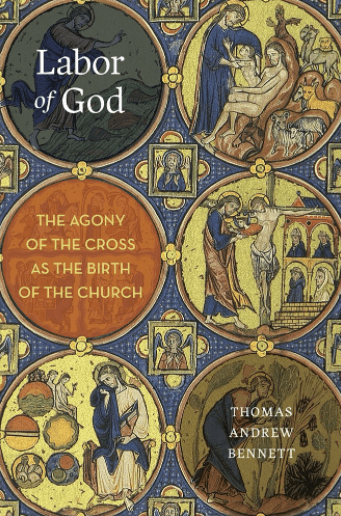Darrin W. Snyder Belousek teaches philosophy and religion at Ohio Northern University and Bluffton University. He taught previously at various church-related colleges—Louisburg College, Bethel College, Lithuania Christian College, Goshen College, and St. Mary’s College. He received his Ph.D. from the University of Notre Dame and has studied at Associated Mennonite Biblical Seminary. He has published many articles, both scholarly and popular, in diverse areas—theology, consistent ethic of life, war and peace, social justice, ethics and economics, and philosophy of science. He has also served the church for seven years in mission assignments through voluntary service and international teaching.
Does—or should—atonement theology have practical implications for the church’s mission in the world today? Is penal substitution the only, or even the best, biblical understanding of the cross?
Scot has invited me (Darrin W. Snyder Belousek) to introduce my book, Atonement, Justice, and Peace: The Message of the Cross and the Mission of the Church (Eerdmans 2012). This book challenges the church to rethink the cross—to reexamine the standard evangelical theology of penal substitution atonement and to reorient our thinking about justice and peace from the perspective of the cross.
My first intuition that something was not quite right with the penal substitution theory—the idea that God has dealt with our sins by having reckoned our sins against Jesus and punished him with death in our place on the cross—came about twelve years ago, while questioning the death penalty.
I had become convinced, based on Jesus’ teaching (“Let the one who is without sin cast the first stone”), that Christians should not support capital punishment. But I was wanting to press the question deeper, to the core of Christian faith—the cross. Jesus’ death, after all, was a death penalty. If there was a definitive Christian answer on the question, it must be found there.
The only atonement theology I knew was penal substitution. I could thus reason: If God had already punished Jesus for our sins, then we who were spared by the cross from the death penalty we deserved had no right to insist that others deserved death for their sins.
That made sense, but it didn’t seem right. I soon figured out why.
The penal substitution theory is based on retributive justice: sin must be “repaid” with death, and God “repaid” our sins by punishing Jesus. But so also is capital punishment: the murderer must be “repaid” his crime with the penalty of death. To affirm penal substitution, therefore, is to affirm the same logic that justifies the death penalty.
I faced two problems. First, the penal substitution theory couldn’t address the question: you can’t overcome the logic of retribution (capital punishment) with the logic of retribution (penal substitution).
Second, the penal substitution theory didn’t square with Jesus’ teaching of God’s kingdom, which is not ruled by retribution: “You have heard that it was said, ‘An eye for an eye and a tooth for a tooth,’ but I say to you…” (Matthew 5). If the cross is the cross of Christ, I thought, our interpretation of the cross ought to be consistent with the teaching of Jesus.
The more I thought it through, the more the conundrum grew. According to Paul’s gospel, Christ’s cross is both the revelation of God’s justice (Romans 3:21-26) and the demonstration of God’s love (Romans 5:6-11). According to penal substitution, God’s justice is satisfied in retribution, Jesus punished for our sins. Yet according to Jesus’ teaching, God’s love transcends retribution: He blesses righteous and wicked alike with sun and rain (Matthew 5). How could the cross be both God’s justice by retribution and God’s love beyond retribution? Is this God’s love—that God punished Jesus instead of us? That didn’t seem right, either. I needed to begin again.
The root of the conundrum, I realized, is that the penal substitution theory of atonement frames the cross by a presupposed and unexamined principle of justice—retributive justice. It then occurred to me: Because the cross of Christ reveals the justice of God, rather than allow a human assumption about justice to interpret the cross, we should let the divine revelation of the cross reshape our understanding of justice.
That was the turning point—the “Copernican Revolution”—in my thinking.
So, I set out to rethink the justice of God from the perspective of the cross of Christ—and to rethink the cross in accord with Jesus’ teaching of God’s kingdom. And wrote a book in the process!
This book, then, does two main things. First, it presents a comprehensive, critical examination of penal substitution and offers a biblically grounded, theologically orthodox alternative understanding of substitutionary atonement. It should thus prove helpful to those who are wrestling with the biblical basis of penal substitution or wondering whether one can reject penal substitution but still affirm substitutionary atonement.
Second, it reorients our thinking about justice and peace—economic justice, capital punishment, the war on terror, ethnic-religious conflict—from the perspective of the cross. It will thus challenge both “evangelically”-minded Christians to become concerned with social issues precisely on account of the cross and “socially”-minded Christians to engage such issues from a “cruciform” perspective.
I now invite you to respond to this post…and to read the book.










